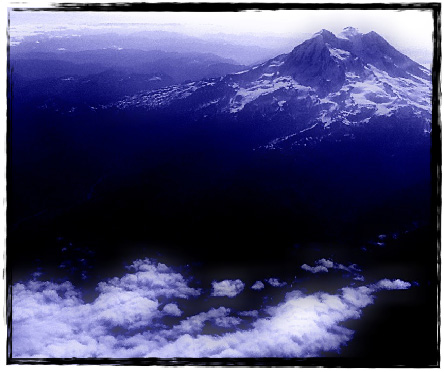Jeremiah Webster
Last year I drove a friend from out of town (Midwest kindred sort) along a road that ran parallel with the Cascade Mountain Range. We were in my pickup, it was early November autumn, and Philip Glass was traversing a minimal number of aching notes on the stereo. We sipped green tea from a thermos. My friend, a devout Catholic, prayed his morning rosary aloud. An obscure collection of essays by Simone Weil rested on the dashboard. It wasn’t your average entourage in a pickup. Our plan was to arrive at Snoqualmie Falls by noon. This was the first time Joshua had seen mountains. Ever.
The sun, not yet above the range, gave each of the jagged summits a kind of halo with its half light, and would span the eastern face by mid-morning. This was remarkable fortune. Puget Sound residents know how rare a clear view of these mountains can be from November through, what… June? Weeks go by and you might as well live on the plains of Nebraska. Visitors miss these mountains entirely if they happen to arrive on one of those perfect suicide days when the rain spatters pedestrians and marine layer devours Rainier. No Cobain on the stereo today though, or promise of showers in the forecast. I reminded Joshua ad nauseum how lucky he was.
As we neared our destination, the Wisconsin native began to sink lower in his seat.
“You okay?”
“I can’t look at them,” Joshua said, “at least, not for a very long time.”
“Seriously?” I asked, given that this was kind of the point.
“Are you seeing this?” he asked, neck craning to see the summit, “no wonder the Ancients believed their gods lived on mountains. I’d worship them too, offer libation, if I thought they resided up there.” This is why I spend time with Joshua. He’s all wide-eyed, even in our mundane thirties. And I realized he was right. I wasn’t “seeing it,” not really, not beyond aesthetic appeal or sheer grandeur. The Cascade Range cuts vertically through Washington State, the shoulder blade of some geological giant, and is home to twenty active volcanoes. It was formed roughly seven million years ago, making Gilgamesh and Hector, Uruk and Troy seem hipster avant-garde. It erupted through eons before humans began defining it with religion, metaphor, lyric. It would receive my ashes. It would bury my children. It would endure.
Life in the West is vertical. The trees, rivers, and mountains require the photographer to turn her camera sideways to capture the vaulting pines, parabolic waters, and sheer elevations of rock. Life is lived beneath these influences, making it increasingly harder the older I get to pursue triviality with any measure of “passionate intensity.1” Denise Levertov understood the spiritual import of a life surrounded by mountains as well. The hidden quality of the Cascades is the hinge that holds her poem “Witness” together. Spiritual deprivation exists in tandem with the sublime visions we long for. Transcendence persists, even when we’re too busy to notice. God is perhaps like that too, an invisible presence who requires deliberate engagement to enrich our lives. The poem encourages the reader to “reconfirm / this witnessing presence,” as though it were a mandate towards the examined life. Joshua taught me that. A friend deprived of mountains resuscitated my awareness of being equally “hidden from the mountain / in veils of inattention, apathy, fatigue.” The incident made me want to head for Stevens Pass on any clear day afforded this short life and witness more than scenery. Anemic word: scenery… suggesting everything the Cascade Range wasn’t as we observed it from a pickup that revelatory fall morning.
Witness / Denise Levertov
Sometimes the mountain
is hidden from me in veils
of cloud, sometimes
I am hidden from the mountain
in veils of inattention, apathy, fatigue,
when I forget or refuse to go
down to the shore or a few yards
up the road, on a clear day,
to reconfirm
that witnessing presence.

1. W.B. Yeats: “The Second Coming”

3 Responses
Jeremiah,
Another poignant passage – our mundane thirties is correct. How easy it is to lose focus in life’s punditry. Your writing forces me to NOT forget the scale of the world we’re surrounded by; our brains are a little too good at processing and, basically, ignoring seemingly “irrelvant” data (like the freakin’ Cascades!) while we push forward with other concerns. I’m happy Joshua brought the wonder back.
Take that nihilism!
A beautifully weaved creative work! Psalm 121, “I look up to the mountains; does my strength come from mountains? No, my strength comes from God, who made heaven, and earth, AND mountains.” (The Message)
Thank you for the encouragement to see afresh, to remember, and “reconfirm that witnessing presence” of God’s handiwork! Another great piece of literary artwork and excellent photography as well!